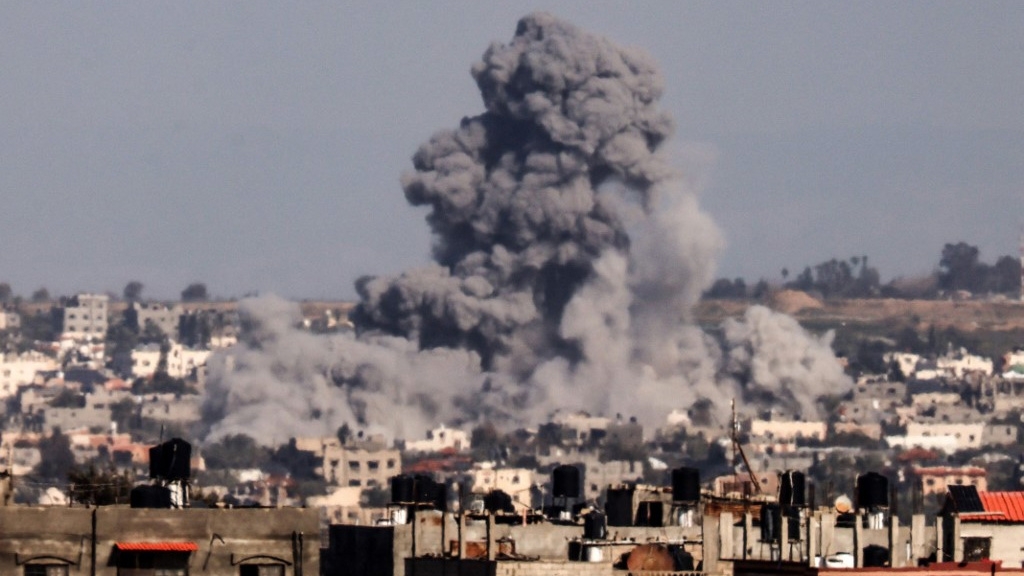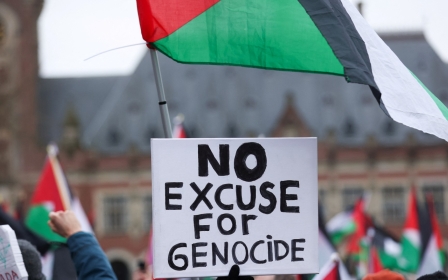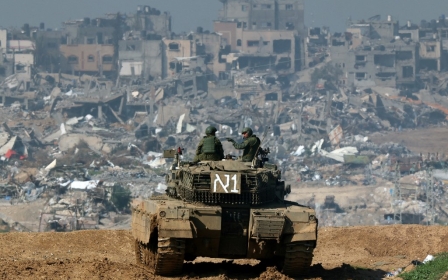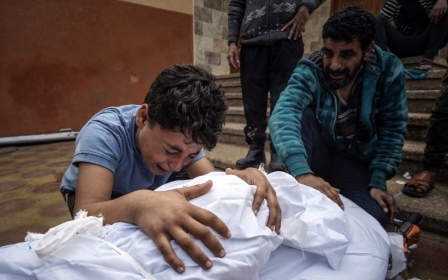War on Gaza: Could the ICJ genocide ruling be a game changer?

A month after South Africa filed a landmark legal action against Israel, accusing that state of committing genocide against Palestinians in Gaza, the International Court of Justice (ICJ), under intense global scrutiny, returned a damning verdict.
South Africa won its application for provisional measures. By an overwhelming majority, the ICJ found a "plausible" case that provisional measures - equivalent to a temporary injunction - were needed to avoid "irreparable prejudice" to Palestinian rights under the Genocide Convention arising from any further Israeli massacres in Gaza.
Rejecting Israel's petition to dismiss the case, the ICJ ordered Israel to cease from any potential acts of genocide and preserve evidence of such acts; to prevent genocide against Palestinians and punish its incitement; to immediately allow humanitarian aid to a starving population in Gaza; and to report back to the court in a month on the steps it has taken.
Acting out of international public interest to uphold a pillar of the post-Second World War rules-based international order, South Africa made this bold move after decades of an Israeli campaign of institutionalised oppression, systematic domination, subjugation, deprivation of basic human rights, and apartheid against the Palestinian people.
Under the pretext of acting in self-defence after the 7 October Hamas attacks, Israel chose a path that strayed from international law. It unleashed extermination-level force against Gaza: a genocidal campaign of wholesale death and destruction, forcible displacement and massive population transfer, starvation, dehydration and infectious disease - blatant acts of aggression whose victims are innocent civilians in need of protection.
New MEE newsletter: Jerusalem Dispatch
Sign up to get the latest insights and analysis on Israel-Palestine, alongside Turkey Unpacked and other MEE newsletters
Open and horrifying calls were made by Israeli political leaders, military commanders and other officials to destroy, in whole or in part, the Palestinians of Gaza. These inflammatory statements have been repeated by soldiers on the ground as they have engaged in mass killings of Palestinians and colossal destruction of Gaza's infrastructure.
In nearly four months, the war has killed more than 27,000 people, including at least 10,000 children - equivalent to more than one percent of Gaza's 2.3 million population. Thousands more are lost under the rubble and presumed dead, while some 66,000 have been injured or maimed. The war has also displaced some 1.9 million Palestinians and laid waste to much of the enclave, rendering it uninhabitable.
Exceptional gravity
The Israeli assault has inspired global outrage. In a world so bitterly divided over the conflicted region, a judicial verdict based on good-faith scrutiny of the facts, and with the moral backing of the world's top court, goes a long way.
The court's ruling has reminded the world that Israel's recurrent invocation of the 7 October attack is, as a matter of law, irrelevant because of the compelling principle that atrocities by one side do not justify atrocities by the other. Indeed, Israel's claim of self-defence is superfluous because a legitimate defence does not permit genocide, known as the "crime of crimes" in international law.
Follow Middle East Eye's live coverage of the Israel-Palestine war
More to the point, Israel's status as an occupying power would entail the applicability of the Geneva Conventions of 1949, which impose binding and enforceable obligations on an occupying power in relation to the inhabitants of the occupied territory, in this case the Palestinians of Gaza - a captive population entitled to special protections and humane treatment.
Given the exceptional gravity and ongoing risks of irreparable harm to the rights of Palestinians in Gaza, South Africa sought a number of provisional measures from the ICJ. These included that Israel halt its military operations in Gaza, cease any genocidal acts, preserve any related evidence, allow the provision of humanitarian aid, refrain from incitement to genocide, and report back to the court within a week.
South Africa's bold action to take on apartheid Israel before the world's top court has openly exposed Israel's long-enjoyed impunity
Widely known for working at a leisurely pace, the court swiftly ordered immediate injunctive measures that largely aligned with South Africa's requests. Although it stopped short of expressly ordering the requested ceasefire, and it gave Israel a month to report back rather than a week, the court's nearly unanimous ruling creates legal obligations on Israel that must be enforced.
The court stressed that all parties to the conflict in Gaza are bound by international humanitarian law. In an extraordinary passage, the court effectively addressed Hamas, noting its grave concern over the fate of the Israelis and others taken captive on 7 October and calling for their immediate release. It also confirmed that its orders to Israel "have binding effect and thus create international legal obligations".
While South Africa has said the court's instructions implicitly translate as a call for an immediate ceasefire, Israel has pointed to the absence of that specific wording and has confirmed that it will continue its onslaught against Gaza. Even if Israel's leaders disregard the court's decision, its international backers have been put on formal notice that they could face the prospect of being implicated in aiding and abetting genocide.
What happens next?
A final judgment on the merits of South Africa's case of genocide against Israel could take several years, but the court's decision on the provisional measures are immediately binding, final and not subject to appeal.
Enforcement is less clear-cut. The court possesses no direct means of enforcing its ruling. Its orders automatically seize the UN Security Council for the purposes of supervising compliance, and all 153 state parties to the Genocide Convention have an obligation to give practical effect to the ruling as a contribution to the prevention of genocide.
At the request of Algeria, the newly elected non-permanent member of the Security Council and its Arab representative, a meeting of the council was convened to discuss the binding force of the ICJ's ruling. If Security Council intervention is blocked by a US veto, in line with its consistent and unwavering support for Israel, South Africa may take the matter to the UN General Assembly, which has previously voted in favour of a Gaza ceasefire.
No matter the challenges of enforcing the ICJ's orders, post-apartheid South Africa's bold action to take on apartheid Israel before the world's top court has openly exposed Israel's long-enjoyed impunity, diversions, and tiring denials of painful truths, to a public process of legal contestation, judicial scrutiny and ultimately adjudication.
Indeed, the ICJ proceedings offer a sort of truth-determining exercise, which on its own will be valuable for the likelihood of the case's success on its merits. A final judgment against Israel could prevent genocide in the future, and deliver reparations that could include financial compensation for the victims; an end to the Israeli occupation and persecution of Palestinians; and granting Palestinians their full rights, including statehood and self-determination.
It also, importantly, holds far-reaching implications for all other states on the duty to prevent genocide and not to be complicit in it, or passive in the face of its serious risk.
A state-centric court, the ICJ tends to sideline victims, but as it reorients itself to take on more cases related to human rights violations, the court provides an accessible and appropriate venue to pursue justice and ensure the survival of a people under ruthless attack, facing the ongoing threats of murder, destruction, and even erasure as a group, in whole or in part.
By taking the lead in this historic case, South Africa has set a fine example. In light of its remarkable political courage, all other state parties to the Genocide Convention must now decide where they align, and whether they want to be on the right side of history by supporting Pretoria on the road to justice for the long-suffering Palestinian people.
The views expressed in this article belong to the author and do not necessarily reflect the editorial policy of Middle East Eye.
Middle East Eye delivers independent and unrivalled coverage and analysis of the Middle East, North Africa and beyond. To learn more about republishing this content and the associated fees, please fill out this form. More about MEE can be found here.






